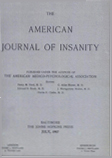AMNESIA, REAL AND FEIGNED
Abstract
Three main groups of causes or types of amnesia are: First, pathological, which may follow certain induced conditions such as head injury, fever, hypoglycemia, drugs and alcohol or may be inherent such as the amnesia associated with various types of epileptic seizures. Second, are psychological amnesias, usually diagnosed as psychoneurosis or hysterias. Third, is feigned amnesia.
The distinctive features and the legal complications of these various types of amnesia are discussed. The electroencephalogram ram seems to provide evidence which in many cases may assist in distinguishing pathological amnesia from the other forms. In those cases in which an illegal act is the result of a period of amnesia which in turn is accompanied by a disorder of the electrical waves of the brain, treatment by means of medicine instead of by incarceration seems reasonable. Intensive research on this point is urgently needed.
Access content
To read the fulltext, please use one of the options below to sign in or purchase access.- Personal login
- Institutional Login
- Sign in via OpenAthens
- Register for access
-
Please login/register if you wish to pair your device and check access availability.
Not a subscriber?
PsychiatryOnline subscription options offer access to the DSM-5 library, books, journals, CME, and patient resources. This all-in-one virtual library provides psychiatrists and mental health professionals with key resources for diagnosis, treatment, research, and professional development.
Need more help? PsychiatryOnline Customer Service may be reached by emailing [email protected] or by calling 800-368-5777 (in the U.S.) or 703-907-7322 (outside the U.S.).



